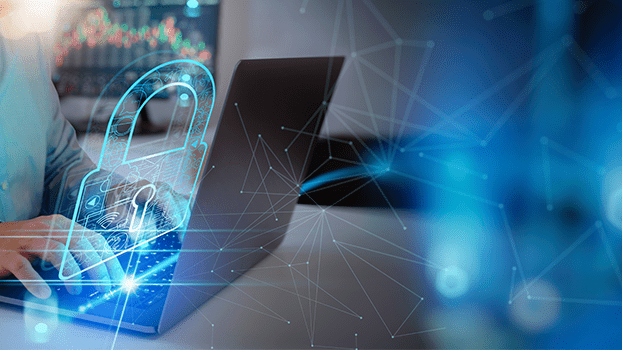Equip Your Team with Cyber Security Training
Secure your organisation and empower your team to stay vigilant against threats with our comprehensive Cyber Security Awareness Training.
The weakest link with your cyber security is often the people within your organisation. Without a positive security culture, teams may hesitate to speak up and flag security breaches, irrespective of the severity.
Our Cyber Security Awareness Training is a user-friendly, comprehensive solution for you to mitigate risks, deliver training, and provide educational cyber security resources for your team. This service ensures you deliver consistent Cyber Security Awareness Training for employees throughout the entire year.
We start with an initial assessment, testing team members on their knowledge of Incident Reporting, Internet Use, Social Media, Email Security, Passwords and Authentication, Mobile Devices, and Human Firewalls.
This is to help us understand the overall level of knowledge across your organisation, allowing us to craft tailored Cyber Security Awareness Training that meets your specific needs.

Speak to an expert
Security Awareness Training Packages
We have three Security Awareness Training Packages – Phishing Tests Only, Security Training Only, or a package that combines both.
Phishing Only
The Phishing Only package includes monthly AI-driven phishing campaigns that evolve based on individual actions. For example, if a user continuously clicks on phishing emails, the difficulty level of their monthly phishing simulation will be reduced to help with their ongoing education.
Phishing Training is also included as part of the package, offering in-depth training on how to spot and report a phishing email. It teaches your teams how to distinguish between spam, phishing, and spear-phishing emails. Targeted remediation phishing training is given to team members who are identified as high-risk.
A Phish Alert Button (PAB) will also be embedded in Microsoft Outlook desktop and online for all users so that in the event a real phishing email is reported, it will be automatically logged with your Sharp Helpdesk team and removed from the user’s mailbox preventing accidental clicking.

Training Only
The Training Only package offers cyber security training to all users following an initial assessment which is delivered to all applicable team members to assess their cyber security knowledge and experience against seven key areas: Incident Reporting, Internet Use, Social Media, Email Security, Passwords and Authentication, Mobile Devices, and Human Firewalls.
The cyber security training is initially deployed to all users within the business and subsequently to any new joiners. A key feature to note is that your organisation’s cyber security knowledge is benchmarked against your peers’, helping you identify and benchmark your cyber security knowledge against similar organisations to you.
Any new team members will be automatically allocated this training. This training plan is established by the team at Sharp and will be reviewed each year in line with available content and ongoing/emerging cyber security threats.

Combined
The combined Security Awareness as a Service package includes both aspects of the Training Only Package and the Phishing Only Package.
An initial assessment will be delivered to all relevant team members, which assesses their cyber security knowledge and experience against 7 key topics; Incident Reporting, Internet Use, Social Media, Email Security, Passwords and Authentication, Mobile Devices, and Human Firewalls. The aim is to understand the cyber security knowledge across your entire organisation so that tailored training can be delivered. Subsequent training will be delivered once a year.
A monthly AI-driven phishing simulation will be sent to all team members, putting into practice what they have learned through the ongoing training. Your team will also learn about the Phish Alert Button (PAB), an email plugin that gives your team a safe way to handle actual or potential phishing emails. It teaches your team how to distinguish between spam, phishing, and spear-phishing emails so that in the event a real phishing email is reported, it will be automatically logged with your Sharp Helpdesk team and removed from the user’s mailbox preventing accidental clicking.

Benefits of our Cyber Security Training Services
Supports GDPR Best Practice
Educating employees on cyber security demonstrates a business’ obligation under GDPR legislation to train their team in protecting personal data. Also proves best practice for security accreditations including ISO27001 and Cyber Essentials.
Fully managed by Sharp
Sharp do all the work so that you don’t have to. Sharp is entirely responsible for delivering cyber security awareness training to your teams, educating employees on cyber security, saving you time and resource, as well as giving you the peace of mind that you have a team of technical experts on hand.
Improved Security Knowledge
Through both cyber security training and phishing training, your team will have an enhanced core understanding of security across the organisations. Even basic cyber security awareness will improve security practices in the workplace and personal lives.
Why Cyber Security Awareness Training is Crucial for Your Teams
Research suggests that 88% of data breaches are due to human error. When your teams lack awareness or regular education, it’s easy to make mistakes and unknowingly fall victim to attacks.
Cyber Security Awareness Training gives your teams the tools and insights they need to recognise and report potential threats effectively. This helps ensure your organisation stays protected from cyber attacks and breaches.
Reports reveal that phishing is the most prevalent type of breach or attack, affecting 84% of organisations. Considering that 28% of the working day is spent reading and responding to emails, this reinforces the importance of providing cyber Security Awareness Training for employees.
Being transparent with your teams about cyber security threats and their responsibilities will give them the confidence to speak up when something goes wrong.
A security aware team essentially creates a human firewall, acting as the first line of defence to safeguard your organisation. With the risk is so high, it’s essential to do all you can to secure your organisation.

Why choose Sharp for your Cyber Security Awareness Training
At Sharp, we recognise that the cyber threat landscape is constantly changing, making it difficult to stay current with the latest threats and to educate your team effectively.
If you’re looking for a technology partner that can offer tailored Cyber Security Awareness Training that will empower your team with the practical skills needed to recognise and respond to cyber threats then you’re in the right place.
Sharp's Cyber Security Awareness Training will not only give your team an improved understanding of the importance of cyber security, the threats and how to stay safe, but you’ll also gain a partner that you can rely on.
In addition to cyber security training for employees, our team of experts can also help with all aspects of Cyber Security. Sharp’s consultative solutions include our Cyber Security Audit, Cyber Essentials Services, Email Security and Endpoint Security.

Cyber Security Services
Learn more about our Cyber Security Offering
Cyber Security FAQs
A human firewall is the term used to describe the collective efforts of an organisations employees to act as a line of defence against various cyber security threats. Just as a physical firewall is a barrier to prevent the spread of fire, a human firewall refers to the network of individuals within an organisation who are educated, vigilant and equipped with the necessary knowledge and skills to identify and respond to threats. Your team doesn’t need to be cyber security experts, they just need to be able to spot and report threats.
Security awareness training for employees is essential because it empowers them to recognise and respond to cyber security threats. By educating your team about risks, evolving tactics, and best practices, organisations create a proactive defence against human errors and cyber attacks. This cyber security training cultivates a positive security culture, reduces data breach risks, enhances compliance, and safeguards brand reputation, which all contribute towards a comprehensive cyber security strategy. At Sharp, we always recommend a multi-layered approach to cyber security and internal training to enhance cyber security knowledge is one key layer to this.
Cyber security is of high importance to businesses due to its multifaceted impact. It shields sensitive data from breaches and unauthorised access, preserving customer trust and safeguarding financial records, proprietary information, and intellectual property. The financial repercussions of cyber attacks are significant, which can result in direct costs like incident response and data recovery, as well as indirect costs tied to reputation damage and business downtime/disruption.
Compliance with stringent data protection regulations is essential, and robust cyber security measures ensure businesses avoid legal consequences and fines. By upholding their operational continuity, thwarting phishing attacks, and addressing emerging threats, businesses bolster their competitive edge and build a foundation of trust with partners and clients. In an era of evolving cyber threats and remote work complexities, prioritising cyber security is an imperative strategy for long-term success and resilience.
Cyber security primarily deals with protecting computer systems, networks, software, and data from cyber threats, which include unauthorised access, attacks, and disruptions. It involves measures to prevent, detect, and respond to cyber attacks, such as hacking, malware, phishing, and denial-of-service attacks. Cyber security often emphasises the digital realm, focusing on protecting electronic assets and systems.
Information security, on the other hand, encompasses a broader scope. It includes the protection of all forms of information, whether in digital, physical, or analogue formats, from unauthorised access, disclosure, alteration, or destruction. This includes sensitive documents, intellectual property, physical records, and more. Information security involves policies, procedures, and controls that safeguard the confidentiality, integrity, and availability of information, regardless of the medium in which it is stored or transmitted.







